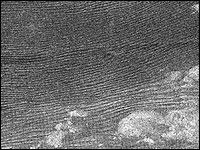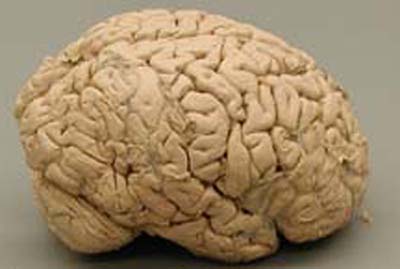Serendip is an independent site partnering with faculty at multiple colleges and universities around the world. Happy exploring!
Emergence, 2009
Emergence
Biology 361 = Computer Science 361
Bryn Mawr College, Spring 2009

|

|

|

|

|
Welcome to the home page for a one-semester course at Bryn Mawr College, spring semester, 2009. Students (and visitors) should be aware that this is a "non-traditional" science course is several respects.
- "Emergence" is an evolving interdisciplinary exploration rather than an existing and well-defined field of study. Students will accordingly be expected to work with each other and faculty in the identification and exploration of relevant materials, and will make available on the web a critical commentary on one of a number of books discussing this newly evolving field.
- Concepts in this area are largely dependent on the development of intuitions gained by making and observing computer models. Students will accordingly devote a significant amount of their time to the exploration and development of such models, and will be expected to complete a final modelling project in a form suitable for public display on the web.
- Students will also be expected to contribute to the education of others in this class and elsewhere by regular participation in a public on line forum for ongoing discussion of conversations, readings and other course activities.
|
Course instructor:
Paul Grobstein |
Course requirements:
|
Grading:
Midterm paper and presentation 30 % |
Course materials:
|
Additional resources:
|



Comments
barrier code
to setup
crt 1
ask patches [if pycor > 0 and pycor < 20 and pxcor = 0 [ set pcolor red ]]
end
to go
ask turtles [set heading random 360
if [pcolor] of patch-ahead 1 = red [ set heading heading + 180]
fd 1]
end
Learning
Learning code
turtles-own [ health ]
to setup
ca
crt 1
ask turtles [ set health 1 set color green]
ask patches [if pycor > 0 and pycor < 20 and pxcor = 0 [ set pcolor red ]]
end
to go
ask turtles [ ifelse health = 0 [ go2 ] [ set heading random 360 fd 1 if pcolor = red [set health 0 set color yellow ]]]
end
to go2
set heading random 360
if [pcolor] of patch-ahead 1 = red [ set heading heading + 180]
fd 1
end
Intro
Hi, I'm Stephanie, a sophomore Computer Science major at Bryn Mawr. Even though I have come from a natural-language based background (having lots of years studying many languages), I have grown to love systems, algorithms and logic-based thinking. And in turn, I'm interested in this class because of how we can apply some computer theory into life's patterns--what can be observed. I love to try to visualize information.
A few questions, spurred by my interest:
How complex is an emerging system?
Can computer science really cover all facets when modelling a system?
How can we apply success/failure rates (inspired by Carol's last question) to modelling a system as a program with Boolean values?
Introduction
Hi --I'm Carol Tuckerman, a McBride student at Bryn Mawr College, majoring in English. I grew up in upstate New York, and my home is currently in Oregon.
In Oregon, as throughout the West, there are a number of environmental issues and habitat concerns that seem to be affecting various bird and fish populations. I've also seen this firsthand on the Hawaiian Islands, where I've participated in several habitat restoration projects with Wilderness Volunteers. Many native Hawaiian bird and plant populations (which exist in symbiosis) are quite fragile, due to the arrival of newcomers, such as the mosquito, which is considered an "invasive species".
Globalization, and the spread of commerce, whether by cargo ship or plane, seems to be influencing species change. It occurs to me that literature expresses this trend towards globalization as well, as human populations are more fluid (thanks to air travel), and ideas are quickly circulated over the internet.
I am looking forward to learning more about biology and Darwin's theory of evolution, and how it may relate to other realms, such as literature.
A few questions:
What are some parallels between how a work of art or literature evolves and how a species evolves?
Is the concept of evolution inevitable in biological, environmental and literary contexts, if we consider that adaptation is likely necessary for "success"?
What is the measure of "success" in biological and evolutionary terms? How might it be different (or similar) from how we consider "success" when evaluating literature?
Intro
I am a junior majoring in biology at Bryn Mawr. I have taken an introduction to computing course but have only a basic understanding of computer science. I am mainly interested in microbiology but having taken an evolution class last semester I found Dawkins explanation of the evolution of complexity from simple origins fascinating.
Questions:
Intro
As a Computer Science major, I have always been interested in relating CS to other subjects and to the real world, whether it is education, biology, finance etc. My internship and other experiences have been in fields relating CS with something else and I think this class will give me a useful perspective. My questions are:
1. How can we model an emergent system?
2. Can we solve real-world problems this way?
3. How can we address exceptions when we are building a model of a system?
Intro
I am a junior biology major/geology minor at Bryn Mawr. I am interested in paleontology, especially the study of evolution as recorded in the fossil record and in other aspects of geologic history. I have very little background in computer science, but I am looking forward to learning more about it.
1) How close can computer models come to representing actual living systems?
2) What does "emergence" actually mean to different people?
3) Can the concept of emergence be used to explain the past course of earth history and/or predict how it will continue?
Intro.
I am a senior at Haverford majoring in Psychology. I am also a Neural and Behavioral Science concentrator, so I am really interested in the brain. I am also interested in the human body. I have never taken a computer science course before, but I am sure that I will learn from others in this class.
1) What are some examples of systems that have no element of emergence at all? Or is there emergence in everything at a certain level?
2) How exactly will we be examining emerging systems and what will we learn from them?
3) How can I link what I have learned in Biology and Psychology to emergence?
I am a senior at Haverford
I am a senior at Haverford majoring in biology at Bryn Mawr. I have a passion for how the human body works, and I believe that my fascination and understanding of the human body can be a valuable contribution to this course. Questions:
Intro
I am a junior at Haverford, majoring in biology at Bryn Mawr. I hope that my experience in various disciplines of biology and limited knowledge of computer science & biomimetics will be useful resources in our exploration of emergence. My three questions are:
Emergence: welcome and intros ...
Looking forward to working together to see what sense we can make of "emergence." Start by adding here a brief introduction to yourself. What distinctive experiences/perspectives do you think you can bring to the conversation? What three questions would you like to see explored this semester? Be as specific as you can.
Then have a look at From Complexity to Emergence and Beyond and put your thoughts about it in week 1 of the course on-line forum area.
Post new comment